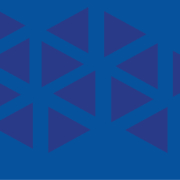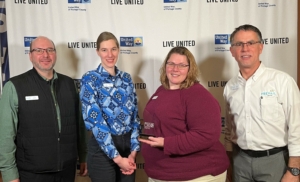
 Prevail Bank – Stevens Point won this year’s United Way of Portage County’s 2023 Best New Campaign Award. This recognition is awarded to an organization that demonstrates best practices and a concerted effort to support the community through United Way. Prevail Bank professionals (l to r) Troy Kempfert, Branch Manager; Michelle Mangal, Commercial Credit Analyst; Amanda Jordan, Process Improvement Analyst; and Dale Sankey, VP; Commercial Lending Officer accepted the award at United Way’s Recognition Luncheon on February 14 at the Holiday Inn Convention Center in Stevens Point.
Prevail Bank – Stevens Point won this year’s United Way of Portage County’s 2023 Best New Campaign Award. This recognition is awarded to an organization that demonstrates best practices and a concerted effort to support the community through United Way. Prevail Bank professionals (l to r) Troy Kempfert, Branch Manager; Michelle Mangal, Commercial Credit Analyst; Amanda Jordan, Process Improvement Analyst; and Dale Sankey, VP; Commercial Lending Officer accepted the award at United Way’s Recognition Luncheon on February 14 at the Holiday Inn Convention Center in Stevens Point.
Archive for month: February, 2024
 By Rose Oswald Poels
By Rose Oswald Poels
Announced earlier this month during the annual Bank Executives Conference, the Wisconsin Bankers Association has launched our newest opportunity for emerging bank leaders — the BOLT (Building Our Leaders of Tomorrow) Leadership Academy. Having long prioritized professional development to ensure that members stay at the forefront of industry trends and best practices as they move through their career, the Association is excited to expand upon this commitment to present a formalized leadership program designed specifically for your bank’s highly motivated emerging leaders.
Each year, thousands of bankers utilize the Association — whether for participating in educational programs or leveraging resources — to foster their professional development and enhance their contributions to the industry. For over a decade, WBA’s BOLT Program has propelled countless bankers across the state into leadership positions. In establishing a comprehensive and structured approach to leadership development as part of the BOLT Leadership Academy, the Association looks forward to continuing our legacy of shaping the aspiring leaders of Wisconsin’s banking industry for generations to come.
The BOLT Leadership Academy takes the success of WBA’s well-established BOLT Program one step further through an all-encompassing and targeted experience for a cohort of 20 to 25 bankers. This structured approach aims to empower participants with the skills and broad knowledge necessary to successfully navigate the complexities of being a leader in the banking industry.
Throughout the 15-month program, bankers will take part in a number of in-person and virtual events — many of which have been developed exclusively for the Academy participants — to facilitate long-lasting connections and hone essential leadership competencies, including strategic management, risk assessment, and communication. The curriculum for the BOLT Leadership Academy extends the BOLT mission to assist members in advancing as leaders all while making the most of the small group setting.
WBA is now accepting applications from aspiring banking leaders who are interested in developing their skills to advance their career in our industry. With limited space available, please encourage your bank’s emerging leaders to complete the application before Friday, March 22, 2024.

Eric Schremp
First Business Bank is pleased to announce Eric Schremp’s promotion to vice president – commercial banking.
Schremp has over 10 years of commercial banking experience primarily serving family businesses and closely held companies of all sizes. He joined First Business Bank since 2013, initially serving as a credit analyst before moving onto the client-facing commercial banking team.
Schremp serves on the Board of Ambassadors for Coaches vs Cancer Wisconsin and has also been active with the United Way of Dane County and National W Club.
He received his bachelor’s degree in business management from the University of Wisconsin – Madison, where he was also a student athlete with the Wisconsin Men’s Golf Team. Schremp was born and raised in Wausau.

Stephen DeLassus
Peoples State Bank announces the hire of Stephen DeLassus to the bank’s southeastern Wisconsin commercial banking team. DeLassus will be charged with helping to lead the Milwaukee-area commercial banking team.
“In a short time in the market, Peoples has built a great reputation as a community bank that puts its customers and employees first,” said DeLassus, vice president and commercial sales team leader. “I’m excited to bring my commercial banking experience to Peoples and to help lead the growing banking team in the greater Milwaukee-area.”
In his new role at Peoples, DeLassus will assist the southeastern Wisconsin business bankers in building client relationships. He brings more than 18 years of experience in commercial banking, most recently helping develop a team of commercial bankers at an established southeastern Wisconsin bank. DeLassus will work closely with Jeff Musa, Peoples’ southeastern Wisconsin market president.
“Stephen’s experience, especially in developing a top-notch sales team, is just what Peoples looked for in this new position. He’s personable, well-connected, and understands that every customer has unique banking needs,” said Musa, Peoples State Bank regional president, southeast Wisconsin. “He’ll be an asset to our commercial banking team, but beyond that, his banking experience will help all facets of our growing Milwaukee-area banking efforts.”
DeLassus is a Michigan native who has lived in greater Milwaukee for nearly twenty years. He studied business administration and finance at Valparaiso University. DeLassus spends time with his family, attending his son’s activities, and volunteering for various non-profit organizations.

Matt Meidl
Additionally, Peoples State Bank hired Matthew Meidl to its commercial banking team. Meidl will work with current and new commercial customers to provide flexible lending programs and deposit solutions to advance their businesses. He’ll be based at the bank’s 1905 Stewart Avenue location in Wausau.
“Peoples is excited to have Matt as part of our commercial banking team,” said Craig Lau, Peoples State Bank vice president – commercial banking. “His banking experience and drive to assist customers will help area businesses grow and succeed.”
Before joining Peoples, Meidl worked as a commercial banker, relationship manager, and credit analyst for other financial institutions in central Wisconsin.
“Working with business customers is challenging yet rewarding,” said Meidl. “I’m excited to learn from Peoples’ experienced commercial banking team and work with new and existing customers to help them grow their businesses.”
Meidl is a Rothschild native, with a Bachelor of Science degree from UW–Stevens Point. He volunteers his time with the Mosinee Area Soccer Association and is a member of both the Wausau Chamber of Commerce and the Portage County Business Council.
Learn more about the oldest operating banks in Wisconsin, how to make the most of your bank’s benefits with WBA, and opportunities to advocate for your industry this spring.
Featured inside are the chair’s column by Donna Hoppenjan, current WBA chair and president and CEO of Mound City Bank, Platteville; the Community Advocate, Eric Glewen, Oostburg State Bank President and CEO; and a recap from the 2024 Bank Executives Conference.
The Wisconsin Bankers Foundation, the non-profit arm of the Wisconsin Bankers Association, has awarded Chad Achenbach and Taylor Lindsay with the 2023 Agricultural Banking Scholarship. Demonstrating the Foundation’s commitment to cultivating the next generation of agricultural bankers in Wisconsin, the Agricultural Banking Scholarship is offered annually in the fall. Two $1,500 scholarships are awarded to students attending an accredited public or private, non-profit college, university, or technical college who demonstrate in their application a strong understanding of the importance of financial literacy and are actively pursuing a career in agricultural finance.
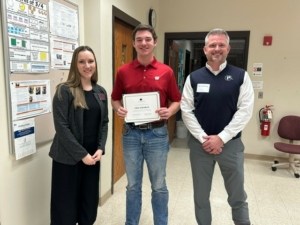
Pictured (left to right) are: Cassandra Krause, executive director, Wisconsin Bankers Foundation; Chad Achenbach, 2023 WBF Agricultural Banking Scholarship recipient; and Cody Kirschbaum, vice president – ag relationship manager, Peoples State Bank.
Chad Achenbach is a declared double major in agribusiness and animal science expected to graduate from UW–Platteville in May 2025. Active throughout the agricultural community, Achenbach grew up on a hobby farm in Eastman, Wis. and was involved with 4-H and FFA through high school. In 2020, Achenbach became an inaugural member of Wisconsin Department of Agriculture, Trade and Consumer Protection’s (DATCP) Wisconsin Agriculture Youth Council, where he gained insight on state agricultural policy development and tools available to support Wisconsin farmers. At UW–Platteville, Achenbach is involved in Alpha Gamma Rho (Beta Gamma chapter), Block & Bridle, and the Pioneer Dairy Club. He also serves as an ambassador for the UW–Platteville School of Agriculture. During the summer of 2023, Achenbach interned at Peoples State Bank in Prairie du Chien, Wis. as an ag loan officer.
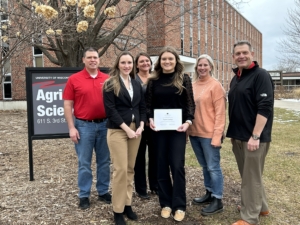
Pictured (left to right) are: Michael DeLong, vice president – commercial/agriculture loan officer, Pillar Bank; Cassandra Krause, executive director, Wisconsin Bankers Foundation; Jenny Jereczek, director of agriculture banking & market president – Durand, Security Financial Bank; Taylor Lindsay, 2023 WBF Agricultural Banking Scholarship recipient; Dr. Brenda Boetel, professor and Agricultural Economics department chair, University of Wisconsin – River Falls; and Tony Betley, vice president – senior agricultural banking officer, Nicolet National Bank.
Taylor Lindsay is a declared agricultural business major and animal science minor expected to graduate from UW–River Falls in May 2025. Growing up on her family’s beef farm in Boyd, Wis., Lindsay has been around agriculture her entire life. Involved in 4-H and FFA throughout high school, Lindsay is pursuing an agribusiness career to not only remain active in the agricultural industry but also to help make a difference in her community. At UW–River Falls, Lindsay is a member of the Agricultural Business and Marketing Society, Agribusiness Leadership Team, Block and Bridle, Collegiate Farm Bureau, and Collegiate Livestock Judging Team. During the summer of 2023, Lindsay interned as an agriculture credit analyst at Nicolet National Bank in Eau Claire, Wis.
“In awarding the Agricultural Banking Scholarship to two deserving individuals, the Foundation aims to support and encourage the growth of talent in the agricultural finance sector,” said Foundation Chair Rose Oswald Poels. “I am pleased to recognize Chad and Taylor for their achievements and outstanding commitment to Wisconsin’s agricultural industry and wish them the very best in their future agribusiness careers.”
To learn more about the Wisconsin Bankers Foundation and its current scholarship opportunities, please visit wisbankfoundation.org.
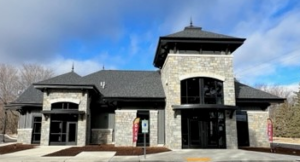 Farmers & Merchants State Bank, a trusted partner in the community for over 125 years, is excited to announce the opening of its newest branch in Lake Mills, Wisconsin. This expansion is a testament to our commitment to serving the financial needs of the communities we proudly call home.
Farmers & Merchants State Bank, a trusted partner in the community for over 125 years, is excited to announce the opening of its newest branch in Lake Mills, Wisconsin. This expansion is a testament to our commitment to serving the financial needs of the communities we proudly call home.
The new branch, located at 550 West Tyranena Road, will offer a full range of banking services designed to enrich the financial lives of our customers. Whether you’re looking for personal banking solutions, mortgage assistance, business banking services, or investment options, our experienced and dedicated team at the Lake Mills branch is here to provide exceptional value and service.

Samantha Oliver
WNB Financial is pleased to announce that Samantha Oliver has joined the bank as mortgage loan officer in Winona.
In her new role, Oliver will use her knowledge and expertise to assist customers through the mortgage loan application and home-buying process. She brings over six years of real estate industry experience, previously working at a title company as a closer, and most recently as a mortgage loan officer at Altra Federal Credit Union. She began her banking career as a teller.
“Samantha is a wonderful addition to our team,” said Scott Ulik, vice president & mortgage manager. “Her knowledge of home lending from beginning to end, her focus on her borrowers, and her positive attitude recommend her well to WNB Financial and any prospective borrowers.”
“While working as a closer at a title company, I realized my passion for the real estate industry,” Oliver said. “From there, I dedicated myself to becoming an expert in the mortgage loan process from start-to-finish. I strive to make the home-buying process seamless and easy for my customers.”
Oliver lives in Galesville with her husband, Shaun, and 14-year-old twins, Kyle and Kira. She’s active in her industry and community as a member of the La Crosse Area Builders Association, the Holmen Business Association, the Apple Affair Committee for the Galesville Area Chamber of Commerce, and looks forward to giving back to the Winona community.
 By Dave Oldenburg
By Dave Oldenburg
With mail theft at an all-time high, bad actors continue to cash in on check fraud. Organized criminals take mail from blue USPS collection boxes, or businesses that have unsecured mailboxes, looking for checks, which are used to deposit to fraudulent accounts and withdraw available funds quickly.
After the checks are stolen, fraudsters “impersonate” the business listed as the payee by fraudulently registering the business with the Wisconsin Department of Financial Institutions. The fraudulent registration is used as documentation to open a new account.
This type of fraud continues to gain traction because legitimate high-dollar checks are pilfered and deposited into an account without having to alter checks — a strategy designed to throw off suspicion.
Common Tactics
- The fraudster may park or is dropped off near the branch to avoid vehicle identification.
- The person opening the account may provide two forms of identification (later determined to be counterfeit) such as an out-of-state driver’s license and a passport identification card.
- The person will furnish a copy of a utility, cable, or mobile phone bill that lists a local address.
- The person opening the account may not deposit the stolen check right away to avoid scrutiny.
Possible Red Flags
- Internet research shows that the business operates out of state.
- Internet research cannot support a connection to Wisconsin.
- The registered agent’s address is outside the geographical area where the business operates.
- Recent and/or multiple business registrations for the same person are listed with the Wisconsin Department of Financial Institutions. Based on the number of stolen checks in their possession, fraudsters may register multiple businesses around the same time.
- The name of the business differs slightly from the payee listed on the check or is a variation of a larger, well-known corporation.
- The signer seems rushed or provides vague information about their business.
Best Practices and Procedures to Prevent Losses
- Consider additional due diligence on new business deposit accounts that were recently registered. A quick Google search will often reveal that the business operates out of state and has no affiliation with the registered agent, or the address they provided.
- Double check for signs of fake or altered identification.
Because there are variations of business impersonation new account fraud, it is best to follow your institution’s best practices and procedures regarding suspicious activity.
Oldenburg is vice president – director of financial investigations at Tri City National Bank, West Allis, and member of the 2023–2024 WBA Financial Crimes Committee

Rachel Priddy
Waukesha State Bank has hired Rachel Priddy as assistant vice president – commercial banking officer.
“We are pleased to welcome Rachel to our commercial banking team,” stated Tony Laszewski, Waukesha State Bank senior vice president – commercial banking manager. “She brings a broad financial background and the technical expertise businesses of southeastern Wisconsin desire from commercial bankers.”
Priddy has nearly 10 years of financial experience including both business and retail banking in addition to internal auditing expertise and earned her bachelor’s degree from the University of Minnesota – Twin Cities. Prior to joining Waukesha State Bank, Priddy worked for the State Bank of Newburg as a commercial loan officer. In her new role as assistant vice president – commercial banking officer, Priddy will be responsible for prospecting, developing, and managing commercial relationships.
Priddy is active in the community serving on the board of directors and as family outreach chair for Love 4 Lexi Foundation (L4L), a Cedarburg non-profit organization dedicated to raising public awareness of the critical need for organ and tissue donation as well as helping children and families who are affected by gastrointestinal dysfunction and other life changing conditions.






